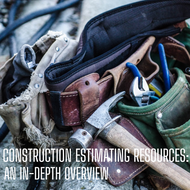Construction Estimating Resources: An In-Depth Overview
Posted by P.J. on Jul 30th 2023
Construction estimating is a critical aspect of the construction industry, enabling project managers and stakeholders to plan and budget for successful project completion. To aid in this process, there is a wide range of resources and tools available. In this comprehensive blog, we will explore various construction estimating resources, including software, online databases, labor rate information, project management tools, and more.
Construction Cost Estimating Software
Construction cost estimating software is an indispensable tool for accurate project estimation. Let's take a closer look at some popular software options and their pros and cons:
RSMeans (by Gordian)
- Pros: RSMeans offers a comprehensive cost database covering various construction categories. It provides frequent updates and seamless integration with other software, streamlining the estimation process.
- Cons: The main drawback of RSMeans is its expensive subscription costs, which might not be feasible for smaller companies. Additionally, some beginners might find the learning curve a bit steep.
ProEst
- Pros: ProEst stands out for its user-friendly interface, cloud-based accessibility from anywhere, and advanced takeoff and estimating features.
- Cons: The software's cost might be prohibitive for smaller businesses, and occasional glitches have been reported by some users.
PlanSwift
- Pros: PlanSwift offers excellent takeoff capabilities and smooth integrations with other software. Its customizability makes it suitable for different trades.
- Cons: Users might find the learning curve steep, and some advanced features may require additional plugins.
Sage Estimating
- Pros: Sage Estimating boasts a powerful database and high customizability. Its integration with Sage accounting software makes it appealing to companies already using Sage products.
- Cons: Smaller projects might not fully leverage the software's complexity, and high initial setup costs can be a hurdle.
Clear Estimates
- Pros: Clear Estimates features a user-friendly interface, pre-built templates, and access to a cost database, making it ideal for smaller businesses and beginners.
- Cons: For larger or more complex projects, the software's limited advanced features might be a drawback.
Online Construction Cost Databases
Online construction cost databases provide valuable historical cost data for more accurate project estimation. Here are some prominent options:
RSMeans Online
- Pros: RSMeans Online offers a vast and reliable cost database, covering various regions and construction aspects.
- Cons: Access to such a comprehensive database often comes with a significant subscription cost.
Craftsman Book Company
- Pros: The Craftsman Book Company provides a wide range of cost data and construction references, suitable for both beginners and experienced estimators.
- Cons: Regular updates might be necessary to keep up with market changes.
BuildingConnected
- Pros: BuildingConnected offers a user-friendly platform for accessing cost data and connecting with contractors and suppliers.
- Cons: The database's scope might be limited compared to specialized cost databases.
National and Regional Cost Data
Government agencies and construction associations publish valuable cost data and construction indices to estimate project costs based on location. Some prominent sources include:
U.S. Bureau of Labor Statistics (BLS)
- Pros: The BLS provides extensive labor-related data, including wage rates, inflation indexes, and more.
- Cons: The data might not be specific enough for some construction projects.
U.S. Census Bureau Construction Spending
- Pros: This data source offers insights into construction spending trends, which can be valuable for project budgeting.
- Cons: It may not provide detailed cost breakdowns for specific construction elements.
Canadian Construction Association (CCA) Construction Reference Guide
- Pros: The CCA guide contains comprehensive cost information for construction projects in Canada.
- Cons: It may not be directly applicable to projects outside of Canada.
Construction Blueprints and Drawings
Detailed construction drawings and blueprints are indispensable for accurate estimating. These may include architectural, structural, electrical, and mechanical drawings.
Material Supplier Quotes
Contacting material suppliers and obtaining quotes for the required materials can significantly improve the accuracy of cost estimates.
Labor Rate Information
Knowing the labor rates for various trades in the project's location is critical for estimating labor costs accurately.
Project Management and Accounting Software
Using software that integrates estimating with project management and accounting facilitates streamlined estimates and cost tracking throughout the project's lifecycle.
Industry Publications and Books
Numerous books and publications focus on construction estimating techniques, guidelines, and best practices.
Experience and Expertise
The knowledge and expertise of experienced construction professionals are invaluable resources in the estimating process.
Online Forums and Communities
Engaging with construction professionals in online forums and communities can provide insights and tips on construction estimating.
Conclusion
Construction estimating is a multifaceted process that requires a combination of reliable resources, tools, and expertise. From construction cost estimating software to online databases, labor rate information, and project management tools, these resources collectively enable construction professionals to make informed decisions and ensure project success. However, it's crucial to stay updated with the latest software and data to maintain accurate estimates in a continuously evolving construction landscape. Remember to conduct further research to find the most suitable resources for your specific construction estimating needs.

